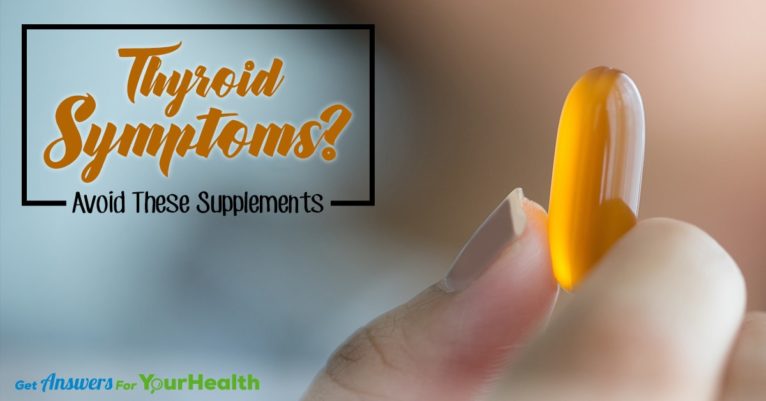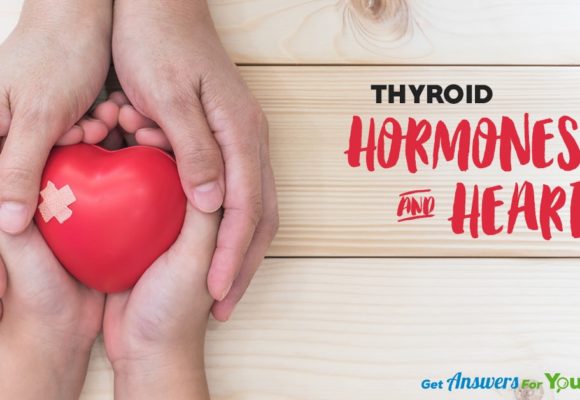1) Grab a FREE copy (Value $14.95) of one of my books Thyroid Symptom Overload
Just pay shipping $7.95 for any US orders. Or, if you want to pay full price plus shipping, order from Amazon :)
2) Take our Thyroid Quiz today and find out what "Thyroid Type" you have
This quiz will help you quickly discover where your symptoms are stemming from.
3) Join Our Thyroid Advocate Membership Site - Natural Thyroid Academy
FREE for a limited time. No credit card required.
4) Work with me and my team privately
Schedule your FREE 15 minute phone consultation and we can find out the best way to help you specifically.
Hypothyroid symptoms can be triggered by an underlying medical condition, such as Graves’ disease, or a nutrient deficiency. Alternatively, hypothyroidism can also occur due to autoimmune dysfunction. Before identifying the supplements to avoid with thyroid symptoms, it is necessary to understand that excess supplementation of a nutrient in the blood can cause hyperthyroidism.
When it comes to thyroid health, there is not any one-size-fits-all formula. Supplementation depends on the diagnosis of the root cause of thyroid symptoms. It is important to remember that various underlying medical conditions can imitate thyroid symptoms. Therefore, appropriate diagnosis by your medical doctor is key.
Complex Relationships
Human anatomies and medical conditions vary from one person to another. Some supplements are necessary for maintaining healthy thyroid, such as iodine. But when available in excess or free form in the blood, these supplements make your blood toxic. The following are the three most known supplements that have a complex relationship with the thyroid.
Iodine and Thyroid Health
From medical doctors to naturopaths and herbalists, all health practitioners hold a firm belief that iodine deficiency can trigger thyroid malfunction, and iodine deficiency can cause hypothyroidism.
According to the American Thyroid Association, hypothyroidism may develop if iodine levels fall in the body. However, another research study concludes that high iodine levels in the blood can inhibit iodide trapping and its organification, hence affecting the hormone released from thyroid glands. The experiments conducted during the research revealed that thyroid hormone levels decreased during high iodine intake, which increased the TSH levels. It revealed that thyroid gland works independently from TSH in responding to the iodine levels.
Iodine has a complex relationship with the thyroid. A research study published in 2009 evaluated the prevalence of endemic goiter and iodine deficiency in the children in Northwestern Greece in 1960’s. According to the study, children with negative antithyroid antibodies had higher urinary iodine concentrations and low thyroid volume.
If a person with autoimmune thyroid disorder is supplemented with iodine, the probability of aggravated thyroid condition becomes higher. As aforementioned, high iodine levels force the thyroid to produce more hormones, which gradually reduces the amount of free T3 for binding and triggers hypothyroidism. Also, iodine reduces the production of thyroid peroxidase. Iodine supplementation is suitable and useful only when thyroid is triggered due to low iodine levels. It is not useful to help for all people who have been diagnosed witha thyroid condition.
Calcium and Thyroid Health
The thyroid produces a hormone, Thyrocalcitonin, which is responsible for boosting the absorption of calcium from blood into the bones. A healthy thyroid produces adequate Thyrocalcitonin to consume the available calcium in the blood. However, bone problems may occur when the thyroid glands do not produce adequate Thyrocalcitonin or the amount of calcium is lower in the blood.
A few decades ago, women, who suffered from bone problems more than men, started consuming calcium supplements without doctor’s prescriptions. When the amount of calcium is higher in the blood, it either forces thyroid glands to produce more Thyrocalcitonin, or free calcium is available in the blood, which intoxicates the blood cells. On one hand, forced Thyrocalcitonin synthesis disturbs thyroid functions, and on the other hand, free calcium increases blood toxic load, which in turn causes thyroid malfunctions. Simply put, excessive calcium in the blood can be harmful to your thyroid health.
Calcium supplements should not be taken without your medical doctor’s prescription, even if you have thyroid symptoms. The chances of toxicity are higher if you do not have low calcium levels in your blood. A research study suggests, “Measurement of S-Ca in every patient being referred to a thyroid outpatient department is recommended because of the frequent occurrence of postoperative hypoparathyroidism and primary hyperparathyroidism in this setting.”
Magnesium and Thyroid Health
Magnesium supplementation has two types of effects on thyroid health. First, if you have thyroid health problems, probability is that your magnesium levels in the blood are low. According to the research study, estrogen and ionized magnesium have inverse relation in menopausal women. In hypothyroidism, your magnesium levels can reduce dramatically. These levels can be measured to evaluate the effect on your thyroid health, but magnesium supplements can mask the problem and lead to poor diagnosis by your medical doctor. In the second condition, if you do not have thyroid dysfunction, but do have an underlying medical condition with symptoms similar to that of hypo- or hyperthyroidism, then magnesium supplementation can cause toxicity in the blood and disturb thyroid metabolic balance.
Selenium and Thyroid
Selenium deficiency is more common among adults with digestive health problems, such as Celiac disease, and adults with chronic health issues. A research suggests that selenium supplementation can help improve the inflammatory condition in patients of autoimmune thyroditis.
In contrast, excess selenium in the blood increases the chances of prostate cancer. By excess, we are referring to daily supplementation above 200mcg/d. In hypothyroidism triggered by iodine deficiency, excess selenium can aggravate the thyroid health condition. Selenium also increases the activity of immune system if taken in controlled quantities.
Supplements to Avoid at all Costs until Diagnosis by Your Medical Doctor/Endocrinologist
Poor supplementation can result in misleading thyroid tests. Biotin, or coenzyme R (Vitamin B7) is becoming increasingly popular due to its various health benefits. Biotin interaction with thyroid hormone is possible in two ways. First, it reduces hair thinning and improves skin health, which may mask the thyroid symptoms for some time and cause confused clinical assessment. The second possibility is its direct interaction with TSH, Thyroid Stimulating Hormone. Biotin supplementation before the diagnostic tests results in too low or too high TSH levels. This can lead to not being able to address the actual cause of the symptoms.
It is also important to avoid Calcium Carbonate Antacids and counter antacids, such as aluminum hydroxide, because these supplements increase toxic load in the blood or interfere with thyroid hormone release functions.
All kinds of multivitamins and herbal supplements, which help boost thyroid functions should be avoided without your medical doctor’s prescription. When you take these supplements, the actual thyroid symptoms can be masked. Regular supplementation can suffice the requirement of minerals, vitamins and other indicators of thyroid health, but for temporary period only.
Supplements to Avoid for 4 Hours When on Synthroid
Synthroid is the most commonly prescribed medicine for thyroid imbalance. Certain foods and minerals tend to assist improving thyroid health, but these may have alternative effects when taken either with thyroid supplements or within 4 hours of taking thyroid supplements. These include:
- All high fiber foods i.e. foods containing more than 5 grams of fiber
- Walnuts – These are rich in magnesium, selenium, and calcium, which may interfere with the effectiveness of thyroid supplements or Synthroid.
- All soy products, including soy milk, tofu, soy yogurt, etc.
- All multivitamins high in B vitamins, or calcium, selenium, magnesium, and iron – A research study suggests that hypothyroidism patients tend to have low ferritin serum, the iron protein.
Basically, all supplements that hide the thyroid symptoms or its indicators should be avoided without your medical doctor’s prescription. For appropriate thyroid treatment:
- Make sure to tell your medical doctor about your current or past supplementations.
- Accurate diagnosis of thyroid symptoms, indicators and its condition is necessary. Therefore, avoid taking supplements a few weeks before visiting your endocrinologist or medical doctor. If you are already taking supplementation, your medical doctor will guide you about the tests and supplement changes required.
Knowledge and understanding helps fight the underlying thyroid symptoms successfully. For more information, feel free to contact us or call, 716-773-4707.








